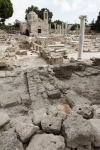Welcome to this series of posts giving a survey of what the early church fathers have written about justification and works of law with reference to Paul. Click this link to go to the first post with the contents of the whole.
In today’s post we look at the Epistle of Barnabas. It is traditionally ascribed to Barnabas who is mentioned in the Acts of the Apostles (Acts 4.36; 9.27; 11.22; etc). It was probably written between the years 70 – 131 and addressed to Christian Gentiles. He associates the counting of righteousness with the covenant and argues Christians (Jews and Gentiles) are heirs of the covenant, not the Jews.
CHAP. XIII.—CHRISTIANS, AND NOT JEWS, THE HEIRS OF THE COVENANT.
But let us see if this people [Christians] is the heir, or the former [the Jews], and if the covenant belongs to us or to them. Hear ye now what the Scripture saith concerning the people. Isaac prayed for Rebecca his wife, because she was barren; and she conceived (Gen 25.21). Furthermore also, Rebecca went forth to inquire of the Lord; and the Lord said to her,
“Two nations are in thy womb, and two peoples in thy belly; and the one people shall surpass the other, and the elder shall serve the younger.” (Gen 25.23)
You ought to understand who was Isaac, who Rebecca, and concerning what persons He declared that this people should be greater than that. And in another prophecy Jacob speaks more clearly to his son Joseph, saying,
“Behold, the Lord hath not deprived me of thy presence; bring thy sons to me, that I may bless them.” (Gen 48.11,9)
And he brought Manasseh and Ephraim, desiring that Manasseh should be blessed, because he was the elder. With this view Joseph led him to the right hand of his father Jacob. But Jacob saw in spirit the type of the people to arise afterwards. And what says [the Scripture]? And Jacob changed the direction of his hands, and laid his right hand upon the head of Ephraim, the second and younger, and blessed him. And Joseph said to Jacob,
“Transfer thy right hand to the head of Manasseh, for he is my first-born son.” (Gen 48.18)
And Jacob said,
“I know it, my son, I know it; but the elder shall serve the younger: yet he also shall be blessed.” (Gen 48.19)
Ye see on whom he laid [his hands], that this people should be first, and heir of the covenant. If then, still further, the same thing was intimated through Abraham, we reach the perfection of our knowledge. What, then, says He to Abraham?
“Because thou hast believed, it is imputed to thee for RIGHTEOUSNESS (Gen 15.6; Rom 4.3):
“behold, I have made thee the father of those nations who believe in the Lord while in [a state of] uncircumcision.” (Gen 17.5; Rom 4.3)
(Roberts, A., Donaldson, J., & Coxe, A. C. (Eds.). (1885). The Epistle of Barnabas. In The Apostolic Fathers with Justin Martyr and Irenaeus (Vol. 1, pp. 145–146). Buffalo, NY: Christian Literature Company.)
Gen 15.6 is quoted in the context of discussing whether the heirs of the covenant are Gentile [uncircumcised] Christians or the Jews.

Abraham believed God and his promise and was counted righteous before he was circumcised. Therefore Christian Gentiles are heirs of the covenant because they share the same faith as Abraham. Barnabas follows the same line of thought as Paul does in Rom 4.10-12.
In the next post we look at Clement of Rome. Clement is believed to be a co-worker with Paul the apostle. He wrote three statements concerning justification. One of which is fairly well known.
Copyright © Joshua Washington and thescripturesays, 2015. All Rights Reserved.



